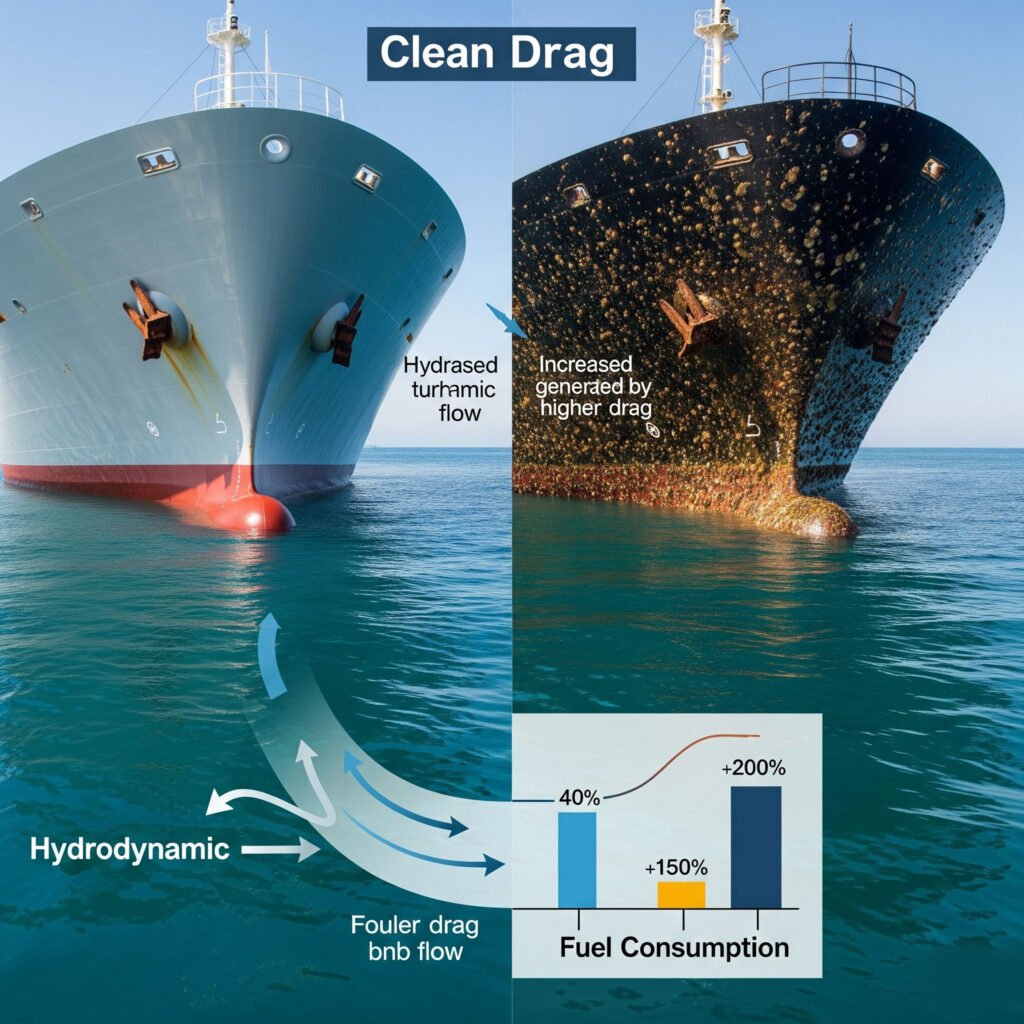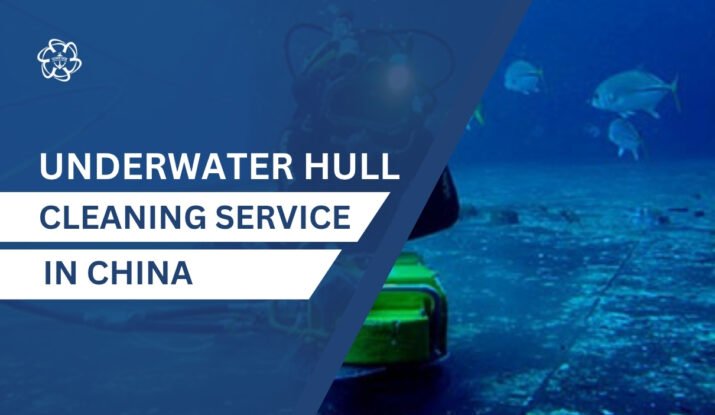Underwater Hull Cleaning in China: Marine biofouling may be silently costing your fleet thousands. The buildup of algae, barnacles, and other organisms on your ship’s hull drastically impacts speed, fuel efficiency, and even regulatory compliance. Many shipowners overlook this invisible threat until it snowballs into expensive problems—higher emissions, failed inspections, and increased dry-docking frequency.
China is emerging as a powerhouse for cost-effective, eco-friendly, and technologically advanced underwater hull cleaning in China. With ports spread across strategic maritime trade routes, access to cutting-edge cleaning equipment, and skilled diver teams, China offers the perfect storm of efficiency and reliability.
Let’s explore why China has become a global go-to destination for hull maintenance and how it can help your fleet sail smoother, cleaner, and smarter.
What Is Underwater Hull Cleaning? And Why It Matters More Than Ever
The Basics of Hull Cleaning

Underwater hull cleaning is the process of removing marine growth from the submerged surfaces of ships while they remain in the water. The operation typically involves divers or remote-operated vehicles (ROVs) equipped with cleaning tools like brush carts, hydraulic scrapers, or cavitation jets.
This cleaning helps:
- Restore smooth water flow around the hull
- Improve propulsion and reduce engine strain
- Lower fuel consumption
- Meet environmental and performance standards
“Think of your ship like an athlete—cleaning the hull is like shaving seconds off your time by removing drag.”
Why It’s Non-Negotiable for Shipowners
Letting biofouling accumulate is like driving with your parking brake partially on. The results?
- Up to 30-40% more fuel usage
- Poor handling and longer voyages
- Non-compliance with IMO biofouling regulations
- Higher maintenance costs in dry docks
If you’re not cleaning your hull regularly, you’re bleeding profit.
China’s Rising Reputation in Underwater Hull Cleaning in China
Strategic Geographic Advantage
With over 18,000 kilometers of coastline and access to major ports like Shanghai, Guangzhou, Shenzhen, Qingdao, and Tianjin, China stands at the heart of global shipping. Ships passing through the South China Sea, East China Sea, and the Pacific trade routes have easy access to port-based underwater maintenance services.
This makes scheduling cleaning during layovers or cargo handling simple and cost-efficient.
Technology Meets Tradition
China combines traditional diver expertise with innovation. Many service providers use:
- Cavitation cleaning systems that remove biofouling without harming antifouling coatings
- High-definition underwater cameras for inspection before and after cleaning
- Brush kart systems and magnetic hull crawlers for hard-to-reach areas
These advancements mean faster cleaning, less downtime, and greater precision.
Availability of Certified Divers
China boasts a growing base of IMCA and ADCI-certified divers. Trained in marine safety, biofouling ecology, and sustainable practices, these divers not only clean effectively but also ensure environmental compliance—a key concern in today’s regulatory climate.
“The training is intense, but essential. Our goal is not just cleaning—we protect ecosystems while doing it,” says Li Zhen, a hull cleaning technician in Shanghai.
Key Service Providers to Watch in China
1. OceanTech Marine Services – Shanghai
A well-established provider in Shanghai, OceanTech uses eco-friendly brush carts and underwater drones. Their 24/7 emergency response team has earned them a reputation for reliability among container ships and oil tankers.
2. BlueBay Marine – Guangzhou
Specializing in bulk carriers and LNG vessels, BlueBay is known for its high-definition hull inspection service, allowing shipowners to see biofouling levels in real-time.
3. Dragon Subsea – Tianjin
This provider focuses on full-hull cleaning and propeller polishing, using cavitation jet tools for non-abrasive removal. They also offer onboard waste collection to comply with port regulations.
Environmental Considerations in China’s Ports
From Regulation to Responsibility
China’s maritime regulations have become stricter over the past decade, pushing for cleaner oceans and sustainable marine services. Underwater hull cleaning in China companies are now required to:
- Collect biofouling debris for proper onshore disposal
- Use tools that preserve antifouling coatings
- Follow IMO’s Biofouling Management Guidelines
Many providers are also adopting closed-loop filtration systems that prevent waste from entering harbors.
“Eco-friendly doesn’t mean inefficient—it means intelligent,” notes a marine engineer from Shenzhen Port Authority.
What Are the Real Benefits for Shipowners?
Performance Boost
A clean hull results in less resistance in the water, meaning smoother voyages and reduced fuel consumption by 15-30%. That’s not just good for your bottom line—it’s a win for the planet too.
Regulatory Compliance
Regular hull cleaning ensures your vessel passes inspections related to invasive species and emission levels. This is particularly vital as IMO pushes stricter limits on maritime emissions.
Fewer Dry-Docking Events
With frequent in-water cleaning, you’ll extend the lifespan of hull coatings and reduce the frequency of costly dry-docking events.
Transparent Operations
Many providers now offer video documentation, before and after the cleaning process. This visual record builds trust and proves compliance, especially when working with third-party charterers.
When and How Often Should You Clean?
Experts recommend hull cleaning:
- Every 3 to 6 months, depending on voyage routes and water conditions
- Before and after extended lay-ups
- When fuel consumption or speed showsa noticeable change
Tip: Schedule cleaning alongside port stops in China to maximize time efficiency.
Sales Pitch: Don’t Let Biofouling Burn Your Budget
Imagine saving tens of thousands of dollars per voyage, increasing your vessel’s speed, and improving your environmental scorecard—all by cleaning what’s beneath the surface.
Why wait?
Whether you’re operating a cargo vessel, tanker, or cruise liner, underwater hull cleaning in China is a smart move. Providers here don’t just scrub—they optimize.
Looking for a provider that balances precision, professionalism, and environmental care? Check out top-tier partners like Cleanship.
Conclusion: China—The Future of Hull Cleaning is Here
If you’ve been asking:
- Why is my ship using more fuel?
- Why are we missing speed targets?
- How do I stay compliant with IMO biofouling rules?
The answer may be hidden below the waterline. The solution? Underwater hull cleaning in China.
With global-standard technologies, affordable pricing, certified divers, and strict ecological practices, China has positioned itself as a leader in efficient hull maintenance. Whether you’re crossing the Pacific or rerouting cargo through Asia, making China your pit stop for cleaning is no longer a maybe—it’s a must.
Take the plunge today.
Learn more and explore sustainable underwater hull cleaning in China solutions at Marinesupercargo.com — where cutting-edge technology meets clean shipping.
FAQs:
Q1. How long does underwater hull cleaning in China take?
A typical session ranges from 6–12 hours, depending on vessel size and biofouling level.
Q2. Is hull cleaning in Chinese ports safe for the environment?
Yes. Most providers use coating-safe tools and eco-certified waste disposal methods.
Q3. Can underwater hull cleaning in China be done during cargo operations?
Absolutely. Cleaning during loading/unloading saves time and reduces port fees.
Q4. Is diver availability a problem in smaller Chinese ports?
Not anymore. Many regional ports now employ IMCA-certified divers year-round.
Q5. What type of vessels benefit most from regular hull cleaning?
Tankers, cargo ships, cruise liners, and even military vessels all gain from smoother, fuel-efficient operations.


